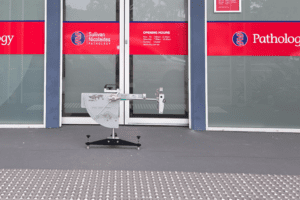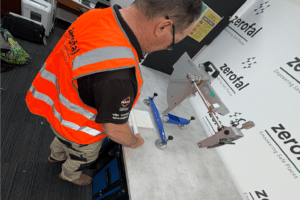Technical Insight - What Certifiers Look for in a Lab Test Report
Certifiers Need More Than a P-Rating
A slip test report under AS 4586-2013 must meet strict criteria to satisfy certifiers—especially for regulated or commercial projects. NATA traceability, slider type, and detailed surface condition are all mandatory. Missing details can delay approval or trigger costly re-tests.
If your product is heading to market, being installed in a regulated space, or specified by architects, your slip test report will likely end up in front of a certifier.
Here’s what they’re checking—and what can get your submission rejected.
Minimum Requirements for AS 4586-2013 Reports
Certifiers expect a professional slip resistance report to include:
- AS 4586-2013 clearly referenced
Reports must state that testing was performed in accordance with this standard—not just “to industry guidelines.”
- NATA traceability
Either the lab must be accredited, or the report must show equipment and procedures traceable to NATA-accredited standards.
- Slider type declared
For wet pendulum testing, the slider rubber must be specified:
- Slider 96 → Four S (hard rubber), used for pedestrian surfaces
- Slider 55 → TRL (softer rubber), used for barefoot areas like pools
- Surface condition described in detail
This includes:
- Coated vs uncoated
- Fixed vs unfixed (was the tile secured for testing?)
- Prepared vs raw (e.g. was a sealer applied?)
- Any identifying marks or batch number
What Gets Reports Flagged or Rejected
- No mention of AS 4586-2013 or incorrect standard version
- Ambiguous or missing description of test method
- Unclear surface condition (e.g. tested raw but sold sealed)
- No reference to slider type or calibration method
- Report from a non-recognised tester without documentation
Even minor gaps can delay certification or lead to re-testing—costing time and undermining confidence in your product.
Best Practice: Supply All Variants
If your product may be sold or installed:
- With or without a coating
- With different finishes (e.g. matte vs gloss)
- Installed using adhesives or direct fix methods
…then test each configuration. Certifiers—and your liability coverage—depend on the actual installed condition.
Zerofal produces clear, NATA-traceable lab reports that meet certifier expectations and support hassle-free approvals.
Certifier-Ready Reports. No Gaps. No Guesswork.
Zerofal produces clear, NATA-traceable AS 4586-2013 reports with everything certifiers need—correct standard, slider declaration, and full surface condition.
- Coated, raw, fixed or unfixed—all configurations tested
- All results delivered in a format certifiers trust
- Lab traceability and compliance documentation included
Explore more

The Five Moments You Should Always Re-Test a Floor
Learn the five moments when re-testing slip resistance matters most — and how timing reduces risk more effectively than routine checks.

When Should a Product Be Re-Tested? The Question Manufacturers Get Wrong
Learn when flooring products should be re-tested for slip resistance and why one result rarely covers a full product range.

Why January Is When Latent Slip Risk Shows Up in Commercial Buildings
January maintenance and reopening cycles can increase slip risk. Learn why early-year verification matters for commercial buildings.
Stay Ahead of Safety Standards
Join the Zerofal newsletter for actionable insights on slip testing, compliance updates, and smart prevention strategies. No spam – just practical safety advice.
